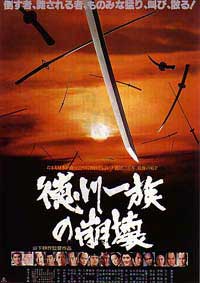Nakamura (Yorozuya) Kinnosuke played Ieyasu Tokugawa in the 1979 epic The Shogun Assassins. In The Shogun's Destiny (Tokugawa ichizoku no houkai, Toei, 1980) he plays Katamori Matsudaira, patriot & supporter of the last two Tokugawa shoguns. These two roles frame the 300 years of Tokugawa rule in Japan, & having the same style & tone to them, do seem to make a "set."
On the cusp of the Meiji Restoration, the Edo government is struggling for time to secure the clan's survival beyond the inevitable loss of its dwindling authority. The final shogun will eventually return the reins of government to the emperor, but must do so in a way that will allow the Tokugawa clan to flourish on a smaller scale. The kuge or aristocratic class has not had any real political power since the Heian period. They have, however, honed intrigue to a fine edge during more than 700 years as figureheads. They are eager to use their skills to regain the imperial rule, though the manipulation of buke or warrior families can be very dangerous.
The emperor is called "Gem" by the numerous military families who vie for possession of this jewel. The Choshu clan requests imperial permission to attack the Tokugawa government. The Satsuma clan has already asked for the same imperial sanctions. The aristocrats insist on an allied attack against the Shogun's forces, although Choshu & Satsuma clans have not previously trusted one another. A branch of the Tokugawa clan is also willing to support the overthrow of the Shogunate. Meanwhile, the Aizu clan leader, Katamori Matsudaira, is trying to split up the alliance between Choshu & Satsuma & win the emperor to the Tokugawa cause.
A little treason. A little romance. Individuals & whole clans change sides & change sides again as the intrigues become more & more complex. Then, before you know it, a third of the film has passed with nary a battle but lots of chatter. When the fighting begins, it's more a relief than a climax.
The film's pose of being jidai-geki, i.e. an historical piece, is supported mainly by the fact that its focus is not wholeheartedly violent. Yet Shogun's Destiny is really toned-down chambara & would have been more successful without its pretensions of historical relevance.
As history, it is all too familiar, with rehashed themes of the previous two decades of Japanese films. This film's chambara elements work much better. When the Satsuma alliance with Choshu is shattered, & the Satsuma general is forced to turn his men against the rebels in his command, it is rapid, intense, realistic swordplay with human emotion & tragedy fully conveyed. Like the best of chambara, it offers not violence for violence's sake, but rather, the expression of mono no aware, the pathos of all things. This pathos of things is far more effective than the historical posturing conveyed in long, stationary sequences with seated, bowing, manipulating, well-costumed talkers.
The score is by Toshiro Mayazumi, the only Japanese composer with an Oscar nomination (for Dino DeLaurentis' The Bible), & it's an effective, dramatic score. However, the score would have fit as easily with Spartacus or Ben Hur. Occasionally a mixture of traditional Japanese imagery and Western-influenced music does work, as with the Spanish-sounding soundtrack for Rashomon or the Carribean drum beat for Samurai Spy. In the current case, it seems that the director wanted one of the best film composers in the world rather than the best composer for the film at hand. A score that made use of Japanese musical scales & instrumentation would have been more effective behind the superb costumes of the kuge & buke classes.
There are some huge-scale battle scenes. If you look into these quarrels, you'll find some fine one-to-one encounters going on, but they tend to get lost in the sheer weight of the clashes. The choreography is excellent but the camera doesn't penetrate the milieu well enough to show us the individuals.
The efforts of Matsudaira & his four sons to save the Tokugawa clan are doomed despite victories for Aizu. Yet Matsudaira makes a great screen hero. Though a zealot for the status quo, he is also utterly human. He is not unmoved by the sacrifices around him. In a sequence near the end, he is performing a sort of Noh dance & imagines he is joined by the ghosts of his three sons: one lost in battle, one killed accidentally by Matsudaira himself, & one who committed seppuku as a political expedient. When he asks his remaining son, "Do you hate me?" one must commend the reply, "Iye!" An instant reply of, "No!"
Director Kosaku Yamashita does not overlook the chance to show this hero's superb swordsmanship. When Matsudaira is attacked while traveling by palanquin, his calm, invincible style wins against many. He is an awe-inspiring fighter. In two-&-a-half hours of film, there was definitely more room for great swordplay of that nature. In striving for historical sweep, Kosaku Yamashita focused too seldom on the individual hero & went too much for the cast-of-thousands Hollywood-epic style of warriors compressed into hordes.
Although there are small flaws in Shogun's Destiny, these flaws stem from striving for more than was achieved rather than from low initial intentions. This is no hackneyed fight flick. It stood as one of the higher-end samurai films for the 1980s.
copyright © by Paghat the Ratgirl
|
